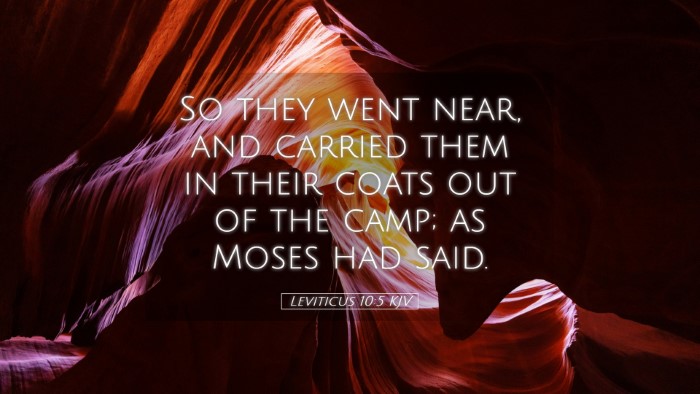Commentary on Leviticus 10:5
Bible Verse: "So they went near, and carried them in their coats out of the camp; as Moses had said." (Leviticus 10:5)
Introduction
This verse occurs within a solemn context in which Nadab and Abihu, sons of Aaron, had offered strange fire before the Lord, leading to their immediate and tragic exclusion from the community of Israel. This passage invites deeper reflection on the gravity with which God views worship and obedience.
Context of Leviticus 10
Leviticus 10 serves as a sobering reminder of the seriousness with which God regards His holiness and the worship practices of His people. The incidents that resulted in the deaths of Nadab and Abihu enforce the importance of adhering strictly to God's commands as outlined in earlier chapters of the Law.
The Call to Holiness
Leviticus underscores the necessity of holiness among God's people. God’s instructions for worship were not mere suggestions, but mandates that carried significant consequences when disregarded. The public domain commentaries highlight that Nadab and Abihu's error serves as a foundational lesson in holiness; God's presence demands reverence.
Commentary Insights
Commentators Matthew Henry, Adam Clarke, and Albert Barnes provide valuable insights that reflect the theological and practical implications of Leviticus 10:5. Below are key themes that emerge from their works.
The Consequence of Disobedience
Matthew Henry: Henry emphasizes that the deaths of Nadab and Abihu were not only a result of specific disobedience but served as a public demonstration of God's intolerance for irreverence. He notes, “This was not only a punishment but a fearful warning to the people of Israel about the seriousness of divine statutes.”
Adam Clarke: Clarke draws attention to the nature of their offering. He notes that while they may have had good intentions, the manner in which they approached God was not in accordance with His commands. This sets up a narrative foundation for understanding divine expectations in worship.
The Role of Leadership
Albert Barnes: Barnes comments on the responsibility of leaders among God’s people to maintain standards of holiness. Those in leadership should be the first to adhere to God's commands. The deaths of Nadab and Abihu, being sons of a high priest, implicate the necessity of accountability among leaders in worship practices.
Symbolism of the Garments
The commentary further explores the significance of clothing in this narrative. Matthew Henry elucidates that the coats mentioned in the passage symbolize outward obedience and the propriety of conduct in worship. Their physical garments became a symbol of their roles and responsibilities before God and the community.
Theological Implications
Theological reflections extend into understanding God's nature. This passage reiterates the duality of God’s character - He is both loving and just. The swift and harsh punishment reinforces the holiness of God, inviting believers to approach Him with formidable reverence.
Implications for Worship
The incident of Nadab and Abihu encourages contemporary worshippers to evaluate their approaches to God. Cheating the conditions of divine worship often leads to serious consequences, even if done with good intentions. Therefore, it emphasizes the need for adherence to biblical prescriptions in worship today.
Practical Applications
- The Importance of Worship: Understanding that worship is not merely a routine activity but an encounter with the Holy God is essential for believers today.
- Accountability in Leadership: Leaders must lead by example and hold themselves to a higher standard to reflect God’s holiness in their ministry.
- Reverence in Practices: Personal and corporate worship settings should reverberate with reverence and respect for God’s presence.
Conclusion
In summary, Leviticus 10:5 serves not only as an account of a historical event but as a profound theological lesson for all who desire to approach God. By reflecting on the insights from revered commentaries, believers can discern the vital implications of obedience, responsibility, and reverence in their worship experiences.


